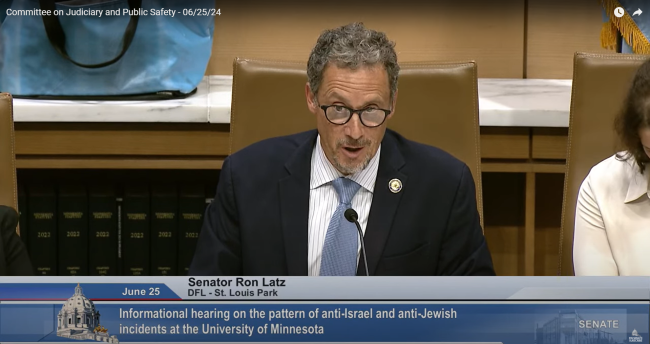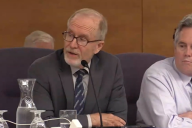You have /5 articles left.
Sign up for a free account or log in.

The Minnesota Senate Judiciary and Public Safety Committee held its hearing over protests at the University of Minnesota on June 25.
Minnesota Senate Media Services/YouTube
The House Committee on Education and the Workforce made headlines this spring as its members grilled three sets of university presidents and board members on their handling of pro-Palestinian protests on campus. Now, lawmakers in several states are following suit and conducting hearings of their own.
Last month Minnesota legislators interrogated Jeff Ettinger, the University of Minnesota’s interim president, during a Senate Judiciary and Public Safety Committee hearing. It came on the heels of a debacle over the proposed selection of a historian who has accused Israel of genocide to lead the university’s Holocaust Center, a vandalism incident at the Hillel Jewish student center, and a controversial settlement with student protesters to end a pro-Palestine encampment in May. Led by a Democratic majority, the committee questioned Ettinger about his “leniency” in mitigating protests and his approach to maintaining a safe academic environment for Jewish learners.
A similar hearing was held in Texas in May, and legislators in Pennsylvania and Virginia are planning to question university leaders in their states in late July and September, respectively. Republican lawmakers in New York have also called for hearings to assess the response of institutions—including private ones such as Columbia and New York Universities—to protests and encampments this spring, but so far without success.
Critics have argued that the federal hearings were driven largely by politics, with conservative lawmakers seeking to weaponize antisemitism and depict colleges and universities as bastions of unfettered liberalism in the middle of a contentious election cycle.
But at the state level, hearings are more likely to be seen as a necessary and expected part of legislative oversight, state lawmakers and higher education experts assert. They contend that regular communication—however heated—between legislators and university administrators allows for a more civil and productive conversation and strengthens the state’s democratic processes.
“State legislatures doing hearings into events occurring on their public campuses is pretty much the norm. That’s actually a relatively common and healthy function,” said Jon Fansmith, senior vice president for government relations and national engagement at the American Council on Education. “It’s not a surprise, really, that the legislators want to hear more about this.”
‘Fair’ and ‘Earnest’ Accountability
The hearing room in St. Paul was fairly packed on a Tuesday in June as lawmakers and constituents waited to hear comments from more than a dozen witnesses, including university administrators, faculty and Jewish students. (Representatives of pro-Palestinian student groups were invited to testify but declined.)
It was also uncommonly quiet, noted Senator Ron Latz, the committee chair.
“Usually before we gavel in there’s a lot of din in the room and I have to quiet everyone down,” he said in his opening remarks. “But not today.”
Latz outlined the reasons for calling such a hearing, saying events on campus “raised statutory, constitutional and public safety concerns.”
He later told Inside Higher Ed that the hearing was not intended to leverage political gain or mimic the Republican-led efforts of the federal education committee; on the contrary, it was a bipartisan endeavor designed to clarify higher education’s policies and processes.
“To me, it’s not a partisan issue, and it ought not to be,” he said. “Everyone on campus, regardless of their religious beliefs and political viewpoints, should feel safe and should have the freedom to get the full academic, educational and institutional benefits from being there.”
During the nearly four-hour hearing, legislators asked witnesses about controversial statements posted on university department websites. They also questioned whether a professor’s submission to a university academic journal was rejected because of the author’s affiliation with an Israeli university and whether it was appropriate to reduce protesters’ punishments in exchange for dismantling an encampment.
The University of Minnesota was one of the first institutions in the country to strike such a deal with pro-Palestinian protesters. As part of the agreement, administrators said they would “advocate to the Minneapolis city attorney for lenient remedies” for those arrested. Trespassing charges against the nine protesters were dropped in early May, but some lawmakers and Jewish advocates fear the decision will embolden students to take similar actions in the future.
Ettinger walked step by step through each concern legislators raised, explaining the reasoning behind them.
“Questions about the limit of free speech often involve constitutional questions beyond our control,” Ettinger said during the hearing. “[But] even when hate is protected by the constitution and cannot be prohibited or sanctioned, the university still responds by supporting those who have been harmed … and working to create an inclusive campus environment.”
“We may not have always gotten it right,” he added. “But I can assure you we tackled each challenge in a manner befitting of the seriousness of those issues.”
After Ettinger’s appearance, which took place during his last week as interim president, the Faculty Senate voted no confidence in him nevertheless.
A university spokesperson declined to provide further comment beyond pointing to Ettinger’s remarks at the hearing and Provost Rachel T. A. Croson’s words during the Faculty Senate meeting.
Lawmakers have taken no action since the hearing; the Legislature is in recess until 2025. Their options are also legally limited, Latz said, given that the flagship—unlike the Minnesota State system’s institutions—is a constitutionally independent entity.
But for Steve Hunegs, a third-generation University of Minnesota grad and executive director of the Jewish Community Relations Council of Minnesota and the Dakotas, it means a lot that the state conducted a hearing at all.
As the final witness, Hunegs expressed concern about the use of “hostile” and “intimidating” phrases in chants, chalking and graffiti during campus protests.
While some that he cited—including “From the river to the sea, Palestine shall be free”—have sparked debates about their meaning, others, such as “victory for the Al-Aqsa Flood,” are seen as clear cries of support for Hamas. To Hunegs, they are all calls for the eradication of the Jewish state, which many Jews find upsetting. But he acknowledged that not everyone agrees and said the hearing handled everything in an “earnest” and “fair” way.
“You saw sort of the full range of Jewish community [perspectives] expressed,” he told Inside Higher Ed. “It was a healthy exercise of democracy in the sense that people had a chance to come testify; they were subjected to cross-examination and different views competed in the marketplace of ideas.”
With Relationships Comes Respect
Virginia state senator Ghazala F. Hashmi—a Democrat who spent nearly 30 years as a professor in the commonwealth before taking office and becoming chair of the education committee—has a similar vision for her state’s new committee on Maintaining Campus Safety and First Amendment Expression.
“Administrators, faculty, staff, and students will be invited to share information and perspectives, with the goal of developing better and more clear policies that protect freedom of speech, the use of public spaces, and the rights of students, faculty, and staff, while also protecting public and campus safety,” she wrote in an emailed statement.
To help the committee “gather the facts,” Hashmi said, administrators will be asked to explain their actions, noting that the rationale behind their decisions will be carefully considered and that she can see the issue from all angles.
“As a former college professor, I understand that academic freedom, critical thinking, debate and dialogue are at the heart of higher education. It is the responsibility of our institutions to teach students to grapple with difficult issues,” she said. At the same time, “every student at every institution of higher education deserves to feel and be safe. It goes without saying that no student should feel targeted on the basis of race, religion, or identity.”
Fansmith, from ACE, hopes that state-level hearings will leverage the closer relationships that lawmakers tend to have with the colleges and universities in their state, creating a more positive outcome for all parties involved.
Many state senators and representatives likely attended the colleges whose leaders they’re questioning, or have family and friends there, he said; at the very least, they have constituents at those institutions. Legislators also provide annual funding and often approve board members for the public institutions in their state.
“One of the things we tend to see at the federal level is less of a focus on moving towards productive solutions and really a little bit more grandstanding, electioneering and politicking,” Fansmith said. “But a lot of times, state legislators may be more considerate in their approach to where they see problems within an institution. They’re coming from a real perspective of wanting to address concerns and resolve issues, in a way that’s not necessarily meant to set an institution up as a punching bag.”
He added, “Just because there’s a hearing on the subject doesn’t necessarily mean it’s negative.”








